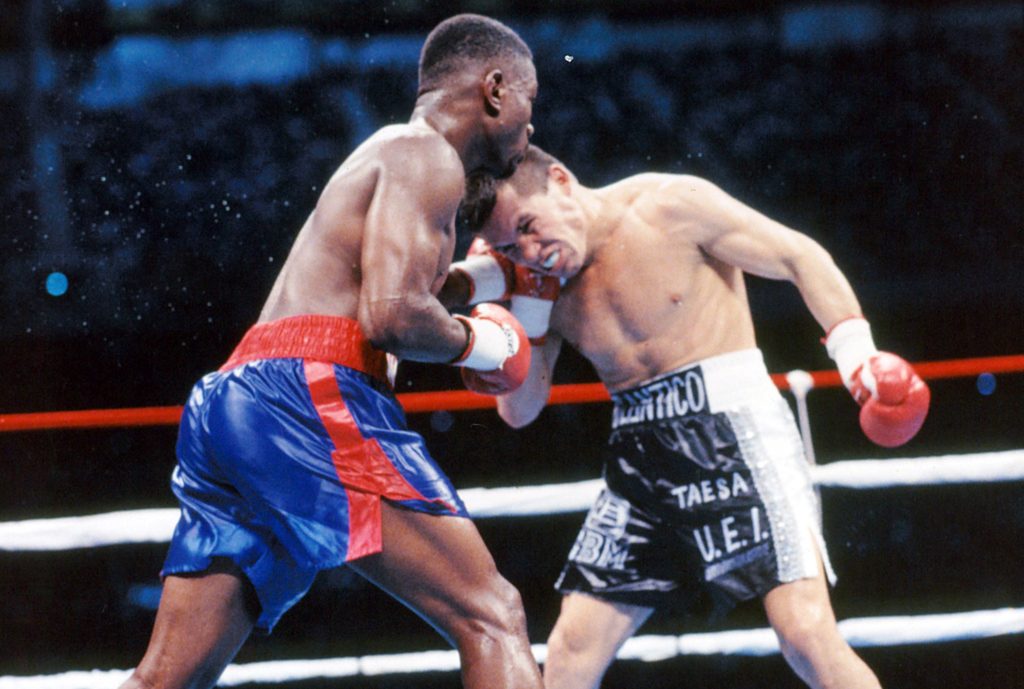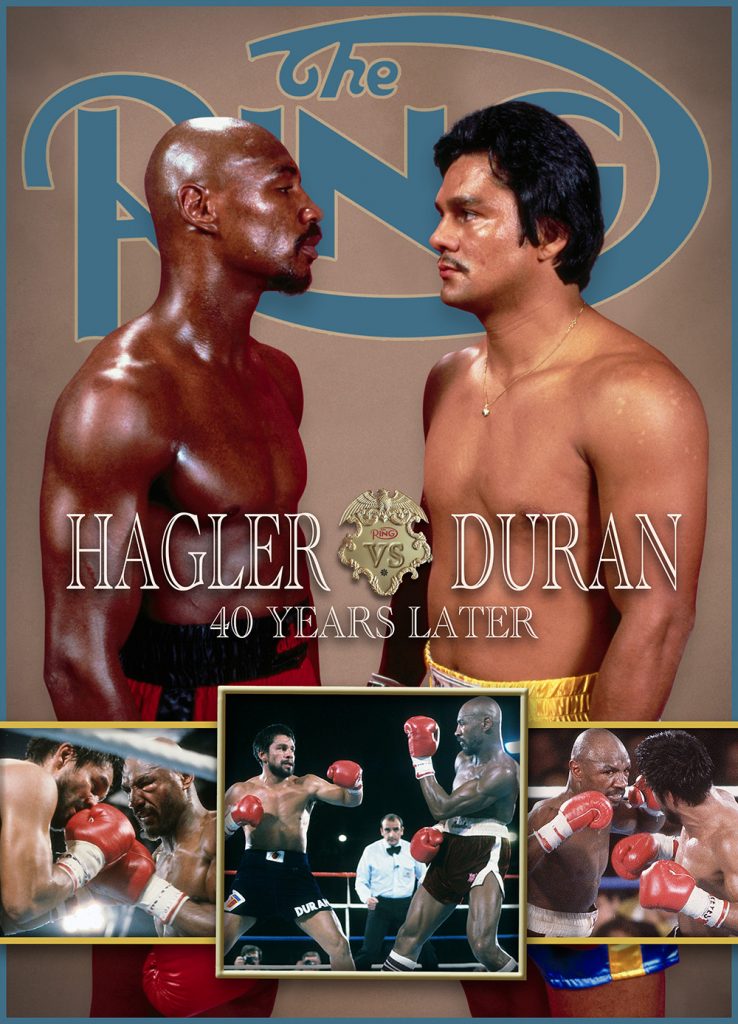Pernell Whitaker, Julio Cesar Chavez and the Alamodome heist

Eighty-seven fights.
Eighty-seven wins.
Seventy-five knockouts.
A lot of fighters would be running for the hills – fast – but Pernell Whitaker couldn’t get invincible Mexican powerhouse Julio Cesar Chavez into a prize ring quick enough. Yes, once upon a time there were actually great fighters who shirked network allegiances and promotional ties to make the best fights possible.
Whitaker fought on HBO but would cameo on Showtime. Whitaker held the WBC welterweight title but agreed to a catchweight of 145 pounds to accommodate Chavez, who was moving up. Whitaker accepted the Alamodome in San Antonio, Texas, as the fight venue, knowing full well that approximately 60,000 Mexican fans would turn up in the hope of witnessing his demise.
There was not one ounce of diva in Pernell Whitaker; he just wanted Chavez in the opposite corner by any means necessary.
After taking lightweight gold at the Los Angeles 1984 Olympics, the dazzling Whitaker turned professional to considerable acclaim. However, his first world title bid ended in heartbreak when then-WBC lightweight titleholder Jose Luis Ramirez became the beneficiary of one of the worst decisions in modern boxing history.
That bogus split decision loss in March 1988 was later avenged, and by August 1990 “Sweet Pea” Whitaker was the undisputed lightweight champion of the world, the first since the legendary Roberto Duran. With the 135-pound division decimated, Whitaker moved north and claimed world titles at junior welterweight and welterweight.

WBC welterweight champion Pernell Whitaker (left) poses with promoter Don King and WBC junior welterweight champion Julio Cesar Chavez. Photo by TIMOTHY A. CLARY/AFP/Getty Images
By the time the Chavez bout was made official for Sept. 10, 1993, the Norfolk, Virginia, southpaw was supremely confident.
“I’m a mover and I like guys coming forward,” Whitaker told Showtime during the buildup to the superfight. “In my arsenal is [the ability] to make [Chavez] miss. My style is to hit and not be hit and whatever it takes for me not to get hit; whether it’s bending all the way down to my knees and letting you punch over my head, as long as you don’t hit me, that’s fine.
“I’m not looking for a knockout, I’m not looking for anything special. I’m just looking to dominate. I’m not even looking to destroy him, I’m just looking to humiliate him. This fight is gonna be the most fun I’ve ever had. I’m gonna be the one that’ll amaze everybody.”
And he would have to be amazing.
While an early result or two on Chavez’s unbeaten resume might have been fabricated – or even changed – this was an awesome fighting machine. Chavez didn’t just cut the ring in half while pursuing an opponent, he chopped it into bits and left his prey with no escape. The pressure Chavez exerted was suffocating and his body-punching brutalized an opponent’s internal organs. He remains, to this day, one of the best offensive fighters of all time.
Like Whitaker, Chavez had worked his way up through the weights. He won the WBC junior lightweight title in September 1984 and made nine successful defenses. However, it was his brilliant 11th-round stoppage of feared Puerto Rican power-puncher Edwin Rosario, which saw him claim the WBA lightweight title, that really turned heads. By February 1990, Chavez was the unified junior welterweight champion and a living legend by virtue of a come-from-behind stoppage of Whitaker’s old amateur teammate Meldrick Taylor. The Mexican icon had triumphed with just two seconds remaining in Round 12.
Chavez was now installed as the favorite to capture a world title in a fourth weight division, but many felt that Whitaker, like Taylor, could present a very difficult style confrontation.
“I’m not gonna have problems with a speedy southpaw, as most people think,” stated the 31-year-old Chavez with the confidence of a man with 87 straight wins. “I’ve been able to handle every other lefty in the past. My training is so specialized for this fight that people will be very surprised when I really hurt Whitaker.
“I believe that I’m going to win the fight by a knockout. If it comes to a decision, I’ll gladly take it because I know that I will win, but I really believe that I will knock him out. Whitaker is gonna learn a lesson, because if he really believes he’s gonna manipulate me and control the fight, then he’s sadly mistaken.”
In actual fact, Whitaker couldn’t have been more right.
For his ring entrance, Chavez was given the mariachi band treatment and the noise around the Alamodome was deafening. But while Whitaker entered the ring to jeering and abuse, he looked absolutely delighted to be there.

Whitaker drills Chavez. Photo from The Ring archive
It took the 29-year-old champion two rounds to configure his defenses to Chavez’s assaults, and then he went to work. His needle-sharp and accurate southpaw jab worked wonders. Over and over again, Chavez would impale his face on that punch and whenever he tried to get his left hook off, Whitaker had stepped around him or moved back to locate open space.
“He’s fighting like Meldrick Taylor,” shrieked ringside commentator Ferdie Pacheco. In truth, the tactics were nowhere near similar. Taylor hit Chavez with blizzards of electrifying combinations, but the Philadelphia native waited around too often and took thumping punches in return. Whitaker was avoiding punishment, controlling distance and essentially turning the fearsome Chavez inside-out in terms of ring generalship. He bashed Chavez with singles, one-twos, multi-punch combinations, and was even winning the battle on the inside. It was a masterclass.
My scorecard gave Chavez the first, the second and the 12th rounds. Everything else went to Whitaker, and in the majority of those sessions, the American was clearly dominant.
Two of the judges, however, had missed a special performance. Jack Woodruff saw Whitaker prevailing 115-113 but was overruled by Mickey Vann and Franz Marti, who handed in tallies of 115-115. The official result was a 12-round majority draw, but while Whitaker retained his WBC title, he should have had the “W” on his resume. He earned it with as beautiful a boxing display as one could ever wish to see.

Still WBC welterweight champion, Whitaker hugs Chavez at the post-fight press conference. Photo by BOB DAEMMRICH/AFP/Getty Images
“I’m not very satisfied,” said a relieved-looking Chavez in his post-fight interview. “Whitaker is a very difficult fighter and it wasn’t one of my greatest fights.
“I tried to force the fight and I believe I won. Whitaker didn’t present a very strong fight, and I want a rematch. He was hitting me with low blows occasionally and intentionally.”
The pot and the kettle, one might say. Whitaker did land numerous low blows during the contest, but you lose count of the amount of hip punches that Chavez had conveniently forgotten about during his post-fight summary. Both men were guilty of that particular infringement.
“We knew going into it that he was going to be hitting me in the legs. I just didn’t let it distract me any,” offered Whitaker afterward. “I just went with the game plan: the uppercuts, the body shots.
“I’m glad we’ve got TV and millions of viewers watching this one. It’s a win for me because the public gets to decide. Take a poll on your next show and you’ll see who they felt won and who they felt lost.”
The great Whitaker, who tragically passed away on Sunday after being hit by a car in his native Virginia, beat Chavez with room to spare and achieved pound-for-pound supremacy. That’s how it was then and that’s how the fight is remembered now.
It’s ironic that despite winning world titles in four weight classes (Whitaker defeated Julio Cesar Vasquez to claim the WBA junior middleweight title in March 1995) and officially besting fellow Hall of Famers that his finest moment was a tie. He might very well be unique in that sense.
But that is a label that suits Pernell Whitaker – he was unique. There will never be another fighter like him.
Tom Gray is Associate Editor for Ring Magazine. Follow him on Twitter: @Tom_Gray_Boxing
SUBSCRIBE NOW (CLICK HERE - JUST $1.99 PER MONTH) TO READ THE LATEST ISSUE















